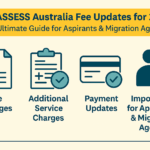The Essential Checklist for Your Canadian Study permit Application
Canada is celebrated for its world-class education system and vibrant, multicultural society. It is a top choice for students globally, but gaining entry requires a
Your Strategic Blueprint for a Successful UK Student Visa Application
The United Kingdom, with its centuries of academic prestige and dynamic cultural landscape, offers an unparalleled educational experience. However, before you can walk the hallowed
Your Strategic Guide to a Successful Australian Student Visa Application
Dreaming of studying in Australia? The vibrant cities, world-class universities, and unique culture wait. But before you can pack your bags, there’s one crucial hurdle:
The Heart of Your Journey: A Strategic Guide to Choosing Your Course Abroad
The decision to study abroad is exhilarating. But once the excitement settles, you face the most critical question of all: what will you actually study?
Blueprint for Your Global Future: Selecting the Right Study Destination
Choosing where to study abroad is more than just picking a spot on the map; it’s about designing the next chapter of your life. The
The Adventure of a Lifetime: A Realistic Look at Studying Abroad
Here at Sherin Overseas Education, we believe that choosing to study in a foreign country is one of the most powerful decisions a student can
GREAT Scholarships for justice and law
GREAT Scholarships for justice and law are for students who want to study law at a UK university for a one-year postgraduate course. Students can
GREAT Scholarships for science and technology
GREAT Scholarships for science and technology are for students who want to study related subjects at a UK university for a one-year postgraduate course. Students
Apply for a GREAT Scholarship, hear student stories and manage your wellbeing
GREAT Scholarships offer students from 18 countries the opportunity to have £10,000 towards their tuition fees for a wide range of one-year taught postgraduate courses.
Streamlined study requirement for Temporary Graduate visas
Temporary Graduate visa (TGV) streams and study requirements The study requirement for a Temporary Graduate visa (TGV) has changed for Graduate Certificate and Graduate Diploma













